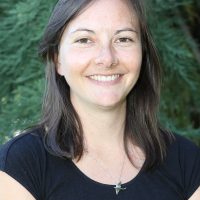Welcoming Andrea Burton, new Assistant Teaching Professor in Marine Biology and SAFS
We welcome Andrea Burton to Marine Biology and the School of Aquatic and Fishery Sciences (SAFS), our newest faculty member. Andrea starts this month as an Assistant Teaching Professor. As a specialist in climate change biology, using molecular and ecological approaches to examine adaptive response to changing conditions, Andrea joins us from UCLA where she was a lecturer.

“I started off young knowing I loved Marine Biology, and after graduating with a BS in the subject at Juniata College, I became a Peace Corps volunteer in Kenya, where I gained experience in teaching at a deaf and hard of hearing school,” Andrea said. “My experience teaching deaf and hard of hearing students was an eye-opening experience to the inequities in teaching.”
Andrea has an impressive record in teaching and pedagogical research, with a certificate in University teaching, instruction at UCLA, plus a research program focused on inclusive teaching practices. “I am interested in how language influences student’s sense of belonging in the sciences,” Andrea shared. “For instance, in what ways does instructor language influence students feeling welcome in the classroom or promote student motivation. A key driver for me is to continually think of ways to make science more accessible to everyone.”
Following her time in the Peace Corps, Andrea continued to study marine biology at Northeastern University in an MS program and completed her PhD at Oregon State University using genomic techniques to examine the adaptive potential of marine invertebrates. “I enjoyed working in a lab and understanding how the smallest material could provide valuable information about animals,” Andrea said. “Educating and mitigating climate change is an important long-term goal I have, to create a world where all organisms can live cohesively with humans.”
After her PhD, Andrea worked at San Francisco State University as a postdoc, studying Discipline Based Education Research (DBER), as a means of applying inclusive teaching practices in biology classes. “One of the ways this can look like in practice is providing Scientist Spotlights to demonstrate and provide students with examples of real scientists who look different than myself, and may align more with my student’s identities,” Andrea shared. “I have studied Instructor Talk, non-content language used by instructors, to examine how language used by my colleagues and I can relate to a student’s sense of belonging.”
Bringing her knowledge of DBER to Marine Biology at UW, Andrea shares what she is most excited about in this transition. “Marine Biology presents unique opportunities that aren’t heavily addressed in DBER literature. For instance, field experience can promote student motivations but could also introduce inequities as to who has access to the field. I am excited to identify such inequities and develop strategies to allow for all individuals interested to have access to the marine biology field,” she said.
Welcome Andrea!